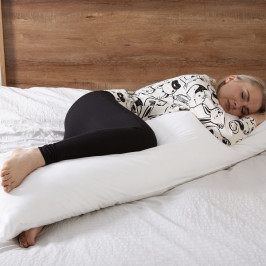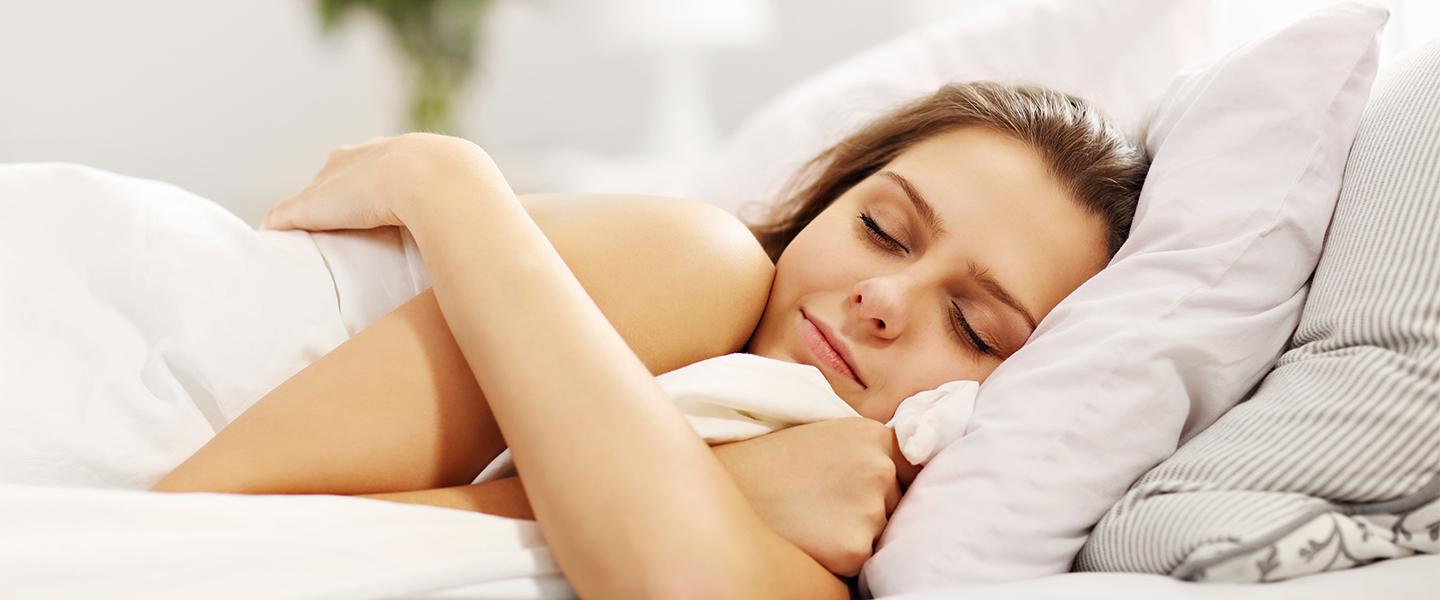11 Tips on How to Improve Sleep and Wellbeing
Our bodies have an internal time keeping clock known as our circadian rhythm. In theory, this naturally occurring body clock tells us when it’s time to wake up and go to sleep, but this schedule can be disrupted as a result of how modern living impacts our natural wake/sleep patterns.
Irregular schedules, exposure to electronic devices, excessive stress and worry and a poor diet and exercise routine are just some of the factors that can contribute to poor sleep and wellbeing. Most of us know this already, but it can be difficult to break out of such damaging cycles.
Here, we look at some useful tips for how you can improve your sleep and wellbeing to get the most out of your waking hours.
1. Take in more natural light during the day
As previously mentioned, our circadian rhythm acts as an internal clock so that our body instinctively knows when to switch off for the day so that we can sleep. However, our modern lifestyle sees us spending much more time indoors than our hunter-gatherer ancestors, and this can wreak havoc on our circadian rhythm.
Give your body clock a boost by aiming to spend more time outdoors taking in natural sunlight. This dose of vitamin D not only works to lower blood pressure and promote good mental health, but it also helps keep your internal body clock healthy – in turn improving your daytime energy as well as your sleep quality and duration at night.
If it’s not practical or possible for you to increase your daily sunlight exposure, you could look to invest in an artificial sunlight lamp, also sometimes called a simulated sunlight lamp or SAD (Seasonal Affective Disorder) light therapy lamp.
2. Limit blue light exposure in the evening
Just as exposure to sunlight during the day is beneficial, night-time exposure to artificial light can have a negative effect on your sleep and wellbeing. Blue light – the kind of light that gets emitted from electronic devices such as smartphones and computers – is the biggest culprit for this and can really disrupt your circadian rhythm.
The light that such devices give out trick your brain into thinking it’s still daytime and this reduces your body’s production of the hormone melatonin, which helps you to relax and wind down ready to fall asleep.
3. Stay off caffeine late in the day
Whist caffeine has been proven to enhance focus, energy, and sports performance; most people know that an espresso before bed isn’t a good idea if you want a good night’s sleep! This is because caffeine, found particularly in coffee and soft drinks, stimulates your nervous system and can block sleep-promoting chemicals in the brain.
The effects of caffeine are measured by its half-life, which typically ranges from 4-6 hours. The half-life means the time that your body has metabolised (processed through) half the caffeine you consumed. It is generally recommended that the cut-off time for consuming caffeine should be a minimum of 6 hours before bedtime – so if you typically go to bed at 10pm, avoiding caffeinated products after 4pm can help to minimise sleep issues.
If you’re in the habit of drinking coffee throughout the day, try incorporating some decaffeinated coffee so that you can still experience the taste, without having to deal with the negative effects when it comes to getting a good night’s sleep.
4. Don’t drink fluids 1-2 hours before bed
Nocturia is the medical term for excessive urination during the night, it affects sleep quality as well as the amount of energy you have during the day. Drinking large amounts of liquids before bed can lead to similar symptoms, though some people are more sensitive than others.
Although hydration is vital for your health, it’s wise to reduce your fluid intake in the evening so try to not drink any fluids 1–2 hours before going to bed. You should also use the bathroom right before going to bed, as this may decrease your chances of waking in the night, leading to an uninterrupted and more restful night’s sleep.
5. Reduce alcohol and sugar intake
Like caffeine, consuming alcohol and sugar can also stimulate your nervous system to the extent that you find it difficult to get to sleep. As well as this, alcohol is known to cause or increase the symptoms of sleep apnoea, snoring, and disrupted sleep patterns, so if you find it harder to sleep or experience broken sleep after drinking, you might want to consider cutting down in order to improve your sleep.
It’s been found that people with high sugar diets tend to sleep less deeply and be more restless at night too. When you eat sugar, your blood sugar level rises which overstimulates your body and gives it energy ready for activity – not what you need when it’s time to go to bed!
And the worst news? Lack of sleep can produce cravings for sugar during the day, so it’s a vicious circle when it comes to the sweet stuff. Remember to enjoy alcohol and sugar in moderation but be mindful of the effects these popular treats can have on your sleep.
6. Keep a regular sleep routine
Another consideration to make when trying to improve your sleep is to make sure your sleep routine is regular. Your body’s biological sleep pattern functions on a set loop which aligns itself with sunrise and sunset.
By keeping your wake and sleep times consistent (to within about an hour of each other every day), it will regulate your circadian rhythm, and this can massively aid your sleep quality over time to the point where you may not even need an alarm as you will naturally wake around the same time each day! You should also try to refrain from napping during the day as this can again affect your sleep/wake cycle and confuse your body’s internal clock into not knowing whether it’s night or day.
If you’re finding yourself so tired that you need a nap during the day, try implementing some of these tips first to see if they help to improve your sleep and this should then make you feel more energetic and less like you need to nap.
7. Exercise regularly
A regular exercise routine is a great way to improve your sleep, as well as both your physical and mental health. You don’t have to be running marathons, either: a brisk walk or some stretches for mobility should be attainable for most people and could significantly reduce the time it takes to fall asleep, as well as help reduce symptoms of insomnia.
When the time it takes you to fall asleep is reduced, the overall time you spend asleep in bed is therefore increased, meaning you wake up feeling better rested and energised; ready to face the day. Just make sure not to exercise too late in the day, as high activity before bed may cause sleep problems.
The stimulation that exercise gives your body and mind increases alertness and your adrenaline levels, so try to keep activity limited to earlier in the day for better sleep results.
8. Optimise you sleep environment
An unorganised, messy bedroom doesn’t make for the calming sleep sanctuary your body and mind need to get the best from your sleep time.
Mess and clutter in your physical space can make it hard for you to relax, and don’t neglect the dusting, either. Dust can aggravate and even cause allergies, causing your throat and nasal passages to close up which may mean you end up focusing on your breathing more when you should be nodding off. Try an anti-allergy duvet and pillow if you’re particularly sensitive to this.
Noise, light, and the temperature of your bedroom can also be deciding factors in getting a good night’s sleep. Try and ensure your sleep environment is as quiet and dark as possible – blackout curtains and blinds work well for blocking out any streetlights or the early morning sun you get during summer months.
Even though it might feel cosy, your bedroom should not be too warm when you go to bed, as this can affect your physiological sleep pattern. Try to keep the air cool, and if you need extra warmth, get this from a high tog duvet or electric blanket, rather than heating the whole room.
9. Take a warm bath or shower
A relaxing bath or shower before bed is another popular way to sleep better. Studies indicate that they can help improve overall sleep quality and help people fall asleep more quickly.
Here’s the science: a warm bath signals the pineal gland in our brain to produce melatonin – the sleep hormone – which also aids a smoother sleep pattern. When you’re immersed in the heat, your body gets warmer and in doing so brings a large amount of blood to the surface. When you get out, the excess heat is released into the air around you, cooling you down and triggering your body temperature to drop. This then gives a cue to your circadian rhythm (remember, the internal body clock that controls your sleep/wake cycle?) that it’s time to snooze.
You could add aromatherapy oils to the bath, too, for an even more relaxing experience. Certain scents such as lavender and vanilla have been proven to reduce stress and anxiety. Alternatively, if you are unable or don’t want to take a bath at night, try a scented pillow infused with sleep inducing fragrance to benefit from the same effects.
10. Invest in new bedding
If you feel uncomfortable in bed, or your sleep environment is giving you aches and pains, it’s time to evaluate your bed itself. It’s recommended that you change your mattress every 6 to 8 years, but if you’re finding it uncomfortable, or you are simply not able to buy a new one, a mattress topper is a great way to breathe new life into your existing mattress and add an extra layer of comfort and support.
The next thing to look at is your pillow. Pillows should be replaced every 1 to 2 years, and it’s important that you are using the correct pillow firmness for your sleep position: side sleepers, back sleepers and front sleepers all require a different type of pillow to ensure that the head, neck and shoulders are properly supported to reduce the risk of waking up with aches and pains.
Another reason you might not be sleeping as deeply as you would like, is that your duvet might not be right for you. Duvets come in several ‘togs’ and this relates to how cool or warm the duvet is – most people prefer a cooler 4.5 tog duvet for summer months, and a heavier, warmer 13.5 tog winter duvet for colder months. If the reason you’re not getting a good night’s sleep is because you’re waking up too warm or too cold during the night, it could be that you require a different duvet for your needs. A summer duvet could be all you need for a perfect night of rest.
11. Relax and clear your mind
We’ve all been there: overthinking and not being able to switch our brains off at night is a common reason for losing valuable sleep time. It can be beneficial to create to-do lists and write your worries down so you’re not keeping them in your head when it comes to bedtime.
Useful strategies for relaxing and clearing your mind before bed could also include listening to music that you find relaxing, reading a book, meditating and deep breathing. There are bedding products to help with this, too. Studies have found that using a weighted blanket in bed can help promote relaxation and reduce feelings of stress and anxiety by creating a gentle pressure over your body.
There are lots of methods that could be helpful in helping you to switch off, so it’s a good idea to try some of them out and find what works for you.
Stop settling for ‘okay’ sleep!
Hopefully you might have seen a tip that you think you could easily try out, and that could make a positive difference when it comes to improving your sleep and wellbeing. As with anything that you want to incorporate into your life to make a routine, it’s important that you feel some benefit from it and that it works for you and your lifestyle.
Nobody should have to settle for sub-standard sleep; it can have a massive effect on how our brains and bodies function. So, whether you give one or two a go or whether you try out all 10 tips, once you find one that helps you, work it into your daily schedule so that you can reap the rewards every day.
As sleep experts, we provide a wide range of bedding to choose from, including duvets and pillows for all sleeping positions.
Read more of our guides:
What's trending now...
-

Slumberdown Super Support Firm Support Side Sleeper Pillow, 2 Pack
£17.00
Shop Now -

Slumberdown All Seasons Combi 15 Tog (10.5 + 4.5 Tog) Double Duvet
£30.50
Shop Now -

Slumberdown Paws for Slumber Navy Pet Bed, Large
£49.00
Shop Now -

Slumberdown Wonderful Wool Mattress Topper, King
£60.00
Shop Now -

Slumberdown Paws for Slumber Extra Large Pet Bed Spare Cover, Grey
£20.00
Shop Now -

Slumberdown Anti Allergy Pillow Protector - Pack of 2
£15.50
Shop Now -

Slumberdown Anti Allergy Mattress Protector - Double
£20.50
Shop Now -

Slumberdown Wonderfully Warm Electric Blanket - Single
£60.00
Shop Now -

Slumberdown Paws For Slumber Sherpa Pet Bed, Medium
From: £25.00
Shop Now -

Slumberdown Super Support Firm Support Side Sleeper Pillow
From: £17.00
Shop Now -

Slumberdown All Seasons Combi Duvet
From: £25.50
Shop Now -

Slumberdown Paws for Slumber Large Pet Bed
From: £49.00
Shop Now -

Slumberdown Wonderful Wool Mattress Topper
From: £54.50
Shop Now -

Slumberdown Paws for Slumber Extra Large Pet Bed Spare Cover
From: £20.00
Shop Now -

Slumberdown Anti Allergy Pillow Protector
From: £15.50
Shop Now -

Snuggledown Scandinavian Hollowfibre Mattress Protector - Single
£14.00
Shop Now -

Slumberdown Wonderfully Warm Electric Blanket
From: £60.00
Shop Now -

Slumberdown Body Support Pillow, 1 Pack, Includes 100% Cotton Pillow Case
£20.00
Shop Now -

Slumberdown All Seasons Combi 15 Tog (10.5 + 4.5 Tog) King Size Duvet
£34.00
Shop Now -

Slumberdown Paws for Slumber Olive Green Pet Bed, Large
£49.00
Shop Now -

Slumberdown Wonderful Wool Mattress Topper, Double
£54.50
Shop Now




